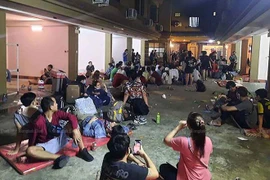Phnom Penh (VNA) – Cambodian Deputy Prime Minister and Minister of Interior Sar Sokha has warned of the worrying cross-border crime that is fueling human trafficking in Cambodia, and calls for more effective efforts against it.
The official, who is also Chairman of the National Committee for Counter Trafficking (NCCT), said that Cambodia is a country suffering from the threat of transnational crimes, where criminal groups have driven the people crazy, confused, and victimised.
Speaking at the launch of Cambodia’s National Report on Combatting Human Trafficking in 2024 and the 2025 Work Goals of the NCCT on March 27, he said Cambodia is threatened by transnational crimes, such as human trafficking, drug trafficking, and technology fraud, where criminal groups have and are driving citizens, young and old, men and women, crazy, lost, and seriously harming them physically, mentally, intellectually, financially, and sexually, to the point of injury, disability, mental disorder, or even loss of life.
He emphasised that the Cambodian authorities have made efforts to combat transnational crimes through effective cooperation with embassies and representative offices of relevant countries. He also asserted that Cambodia needs to make further attempts to thoroughly address various forms of transnational crime to protect Cambodian citizens and foreigners in the country.
Additionally, the head of the NCCT instructed local authorities in border areas to be prepared to prevent and curb waves of illegal immigration into and out of Cambodia during the upcoming traditional Choul Chnam Thmey festival in mid-April.
Chou Bun Eng, Permanent Vice Chairwoman of the NCCT, said that in 2024, Cambodia cracked down 197 cases relating to human trafficking and sexual exploitation, an increase of over 20% compared to the previous year.
The authorities identified 523 victims and arrested 273 suspects and sent them to court, including 30 foreigners.
What is noteworthy is the increase in the trafficking or sexual exploitation of children, both in person and online, with 230 minor victims under the age of 18, 40% higher than that of the previous year./.




























